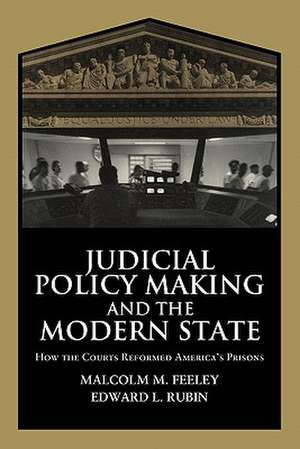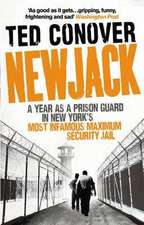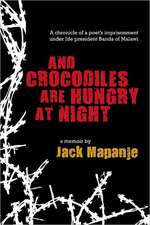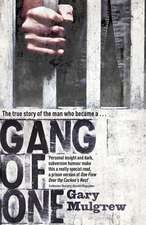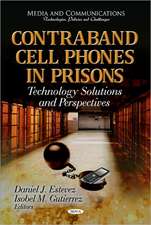Judicial Policy Making and the Modern State: How the Courts Reformed America's Prisons: Cambridge Studies in Criminology
Autor Malcolm M. Feeley, Edward L. Rubinen Limba Engleză Paperback – 27 mar 2000
| Toate formatele și edițiile | Preț | Express |
|---|---|---|
| Paperback (1) | 450.49 lei 6-8 săpt. | |
| Cambridge University Press – 27 mar 2000 | 450.49 lei 6-8 săpt. | |
| Hardback (1) | 873.52 lei 6-8 săpt. | |
| Cambridge University Press – 12 iun 1998 | 873.52 lei 6-8 săpt. |
Din seria Cambridge Studies in Criminology
-
 Preț: 327.00 lei
Preț: 327.00 lei -
 Preț: 236.42 lei
Preț: 236.42 lei -
 Preț: 288.42 lei
Preț: 288.42 lei - 11%
 Preț: 693.51 lei
Preț: 693.51 lei -
 Preț: 374.88 lei
Preț: 374.88 lei -
 Preț: 282.87 lei
Preț: 282.87 lei -
 Preț: 324.70 lei
Preț: 324.70 lei -
 Preț: 244.90 lei
Preț: 244.90 lei -
 Preț: 295.08 lei
Preț: 295.08 lei -
 Preț: 242.58 lei
Preț: 242.58 lei -
 Preț: 319.99 lei
Preț: 319.99 lei -
 Preț: 317.78 lei
Preț: 317.78 lei -
 Preț: 244.31 lei
Preț: 244.31 lei -
 Preț: 274.85 lei
Preț: 274.85 lei -
 Preț: 420.66 lei
Preț: 420.66 lei -
 Preț: 315.54 lei
Preț: 315.54 lei -
 Preț: 371.06 lei
Preț: 371.06 lei -
 Preț: 281.30 lei
Preț: 281.30 lei -
 Preț: 339.86 lei
Preț: 339.86 lei -
 Preț: 311.99 lei
Preț: 311.99 lei -
 Preț: 375.68 lei
Preț: 375.68 lei -
 Preț: 248.18 lei
Preț: 248.18 lei -
 Preț: 342.09 lei
Preț: 342.09 lei -
 Preț: 432.55 lei
Preț: 432.55 lei -
 Preț: 333.68 lei
Preț: 333.68 lei - 14%
 Preț: 873.52 lei
Preț: 873.52 lei -
 Preț: 221.17 lei
Preț: 221.17 lei -
 Preț: 322.62 lei
Preț: 322.62 lei -
 Preț: 321.31 lei
Preț: 321.31 lei -
 Preț: 290.54 lei
Preț: 290.54 lei -
 Preț: 294.90 lei
Preț: 294.90 lei -
 Preț: 407.72 lei
Preț: 407.72 lei -
 Preț: 288.54 lei
Preț: 288.54 lei -
 Preț: 279.98 lei
Preț: 279.98 lei -
 Preț: 284.78 lei
Preț: 284.78 lei
Preț: 450.49 lei
Nou
Puncte Express: 676
Preț estimativ în valută:
86.21€ • 89.49$ • 71.89£
86.21€ • 89.49$ • 71.89£
Carte tipărită la comandă
Livrare economică 24 martie-07 aprilie
Preluare comenzi: 021 569.72.76
Specificații
ISBN-13: 9780521777346
ISBN-10: 0521777348
Pagini: 508
Dimensiuni: 152 x 229 x 29 mm
Greutate: 0.74 kg
Editura: Cambridge University Press
Colecția Cambridge University Press
Seria Cambridge Studies in Criminology
Locul publicării:New York, United States
ISBN-10: 0521777348
Pagini: 508
Dimensiuni: 152 x 229 x 29 mm
Greutate: 0.74 kg
Editura: Cambridge University Press
Colecția Cambridge University Press
Seria Cambridge Studies in Criminology
Locul publicării:New York, United States
Cuprins
1. Introduction; Part I. The Case of Judicial Prison Reform: 2. An overview of judicial prison reform; 3. Two classic prison reform cases: Arkansas and Texas; 4. Three variations on a theme: the Colorado penitentiary, the Santa Clara county jails and Marion penitentiary; Part II. The Theory of Judicial Policy-Making: 5. Defining the problem, identifying the goal, and rejecting the principle of federalism; 6. Creating doctrine, choosing solutions and transforming the rule of law; 7. Implementing the solution, muddling through and ignoring the separation of powers principle; 8. Conclusion; 9. CODA: assessing the successes of judicial prison reform.
Recenzii
' … this book deserves recognition as a classic in the field of judicial studies. Although it sounds like hyperbole to call a book a 'monumental achievement,' Judicial Policy Making and the Modern State truly deserves that accolade.' Christopher E. Smith, Michigan State University in Judicature
' … this is certainly the best anyone has ever written about the prison cases. It is also the best anyone has written about judicial policy making.' Larry Yackle, Boston University Law School
'Lawyers, and especially law students, need (and may not now get) a core of shared stories to understand our legal system, its evolution, and the role of lawyers and courts, and few stories pack the emotional wallop or are as inherently interesting as this one … These descriptions should be mandatory reading for law students and desired reading for any lawyer interested in the function of American courts or prisons.' Marc Miller, Stanford Law Review
'Feeley and Rubin have produced a kind of tour de force in legal theory. Besides offering a lively history of the prison reform litigation itself, they have provocative and often incisive comments on core issues of constitutional theory such as federalism, separation of powers, and the role of the federal courts.' Daniel A. Farber, Law & Social Inquiry
' … judges would do well to read a new book by scholars Malcolm Feeley and Edward Rubin, Judicial Policy Making and the Modern State: How the Courts Reformed America's Prisons. It is an eye-opening account of how federal judges have gone beyond enforcing the Constitution to impose their own policy preferences on state and local government. The authors, respected scholars who approve of judicial policy making, reveal a secret that has long been suspected: Judicial supervision of prisons cannot be squared with federalism, separation of powers or even traditional notions of the rule of law.' David Schoenbrod and Ross Sandler, The Wall Street Journal
' … this is certainly the best anyone has ever written about the prison cases. It is also the best anyone has written about judicial policy making.' Larry Yackle, Boston University Law School
'Lawyers, and especially law students, need (and may not now get) a core of shared stories to understand our legal system, its evolution, and the role of lawyers and courts, and few stories pack the emotional wallop or are as inherently interesting as this one … These descriptions should be mandatory reading for law students and desired reading for any lawyer interested in the function of American courts or prisons.' Marc Miller, Stanford Law Review
'Feeley and Rubin have produced a kind of tour de force in legal theory. Besides offering a lively history of the prison reform litigation itself, they have provocative and often incisive comments on core issues of constitutional theory such as federalism, separation of powers, and the role of the federal courts.' Daniel A. Farber, Law & Social Inquiry
' … judges would do well to read a new book by scholars Malcolm Feeley and Edward Rubin, Judicial Policy Making and the Modern State: How the Courts Reformed America's Prisons. It is an eye-opening account of how federal judges have gone beyond enforcing the Constitution to impose their own policy preferences on state and local government. The authors, respected scholars who approve of judicial policy making, reveal a secret that has long been suspected: Judicial supervision of prisons cannot be squared with federalism, separation of powers or even traditional notions of the rule of law.' David Schoenbrod and Ross Sandler, The Wall Street Journal
Descriere
Investigates the role of federal judges in prison reform, and policy making in general.
